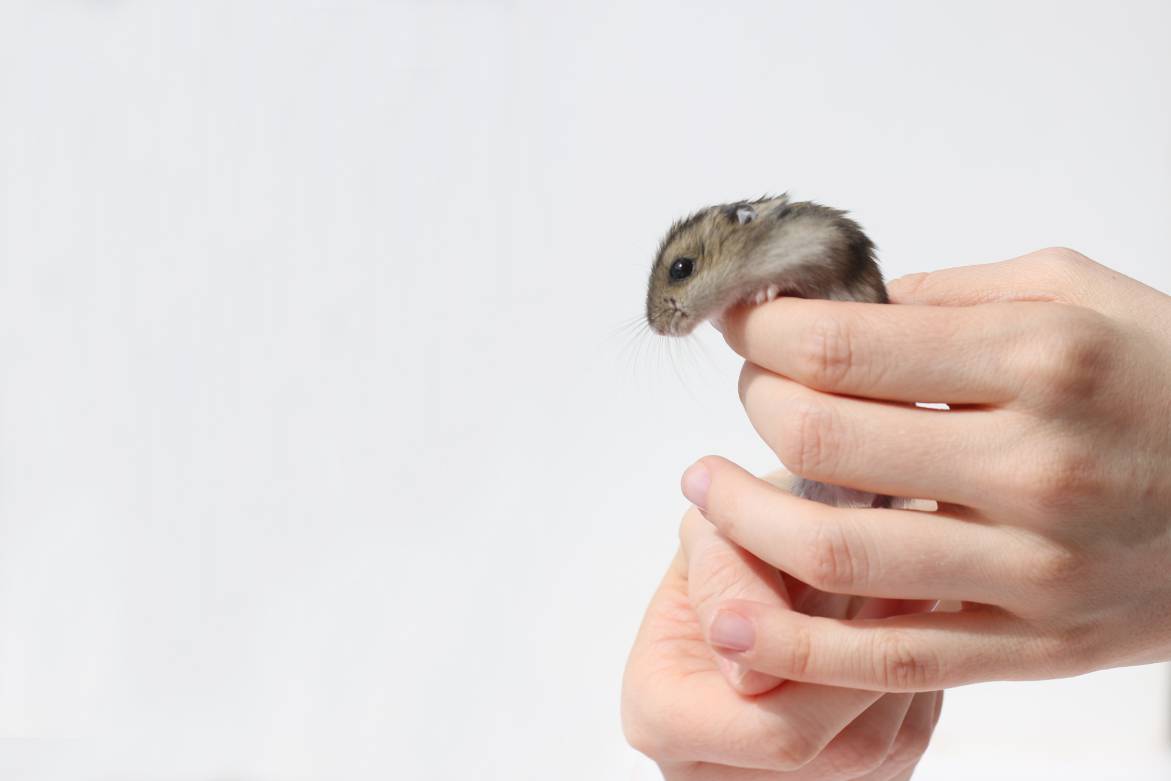Can Hamsters Eat Nuts? Vet-Approved Facts & Safety Guide
Updated on
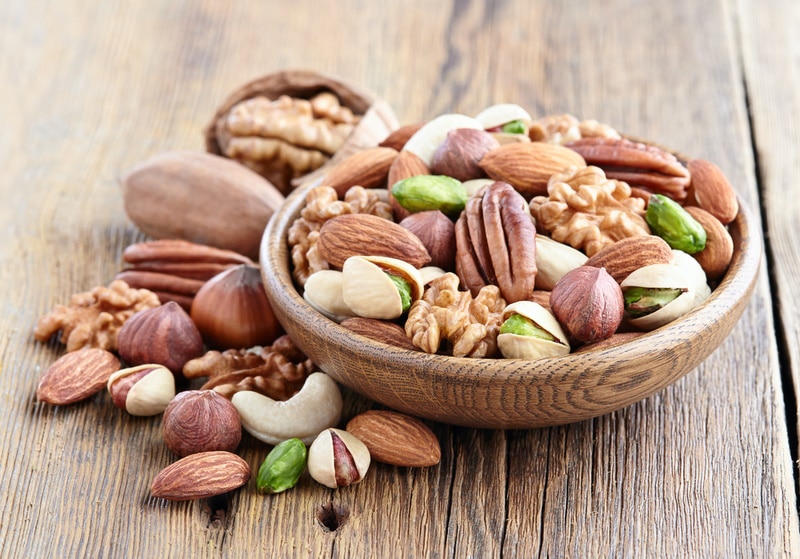
Click to Skip Ahead
Hamsters are omnivores, and in the wild, they mostly eat a mixture of plants, insects, fruits, and veggies. It’s best to provide your furry friend with a blend of foods similar to what they would eat in the wild to ensure your hamster’s health. When it comes to nuts, there are plenty of different kinds: walnuts, pine nuts, chestnuts, hazelnuts, etc. But can you let your hamster enjoy nuts? In short, hamsters can enjoy most nuts in moderation as long as they are unsalted, unsweetened, and not seasoned in any way. Let’s take a closer look at safe nuts to feed and what to avoid.
What Nuts Can Hamsters Eat?
As we’ve mentioned, hamsters can enjoy certain nuts from time to time, but it’s important to know what type of nuts your hamster can safely eat. For example, if you want your hamster to enjoy peanuts, you must ensure the peanuts contain no added salt and seasonings.
Let’s break down common nuts that are safe for your hamster. Remember, however, that any nuts you provide should only be given in moderation as a treat with no added salt, seasonings, or flavorings.
- Walnuts
- Brazil nuts
- Hazelnuts
- Cashews
- Unsalted peanuts
- Pine nuts
- Almonds (non-bitter)
- Macadamias
- Pistachios
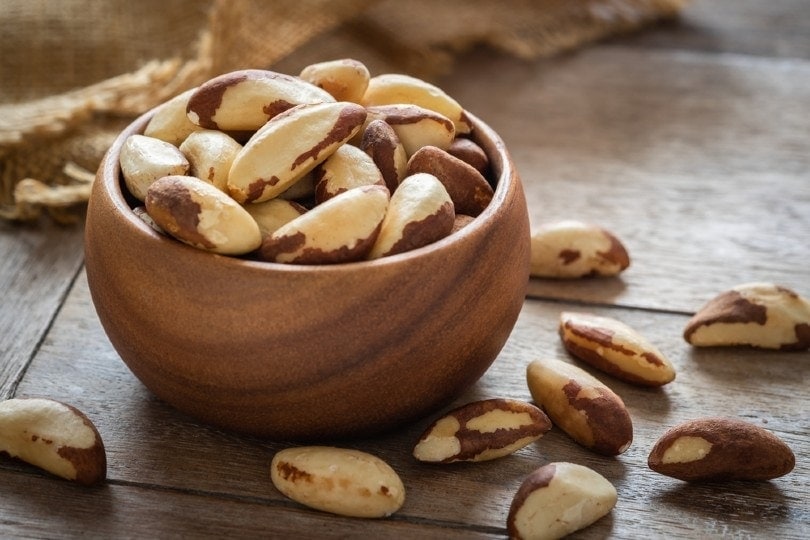
Health Benefits of Nuts for Hamsters
Safe nuts suitable for your hamster to consume are a source of protein and can offer various nutritional benefits. Let’s now break down some of the other nutritional benefits of the safe nuts listed above. All should be offered unsalted and unflavoured.
- Walnuts: Contain potassium and vitamin E, as well as being a great source of B vitamins and healthy fats.
- Brazil nuts: Nutrient-dense and offer antioxidants, potassium, iron, calcium, magnesium and Vitamin B6. Due to their size and fat content, cut them in half, especially for dwarf hamsters.
- Hazelnuts: An excellent source of vitamin E, manganese and copper. They are relatively high in calories and fat though so should be reserved for an occasional treat.
- Cashews: Benefits include healthy fats, antioxidants, magnesium, zinc, phosphorus, and iron.
- Unsalted peanuts: Peanuts are technically a legume rather than a nut, they are a good source of phosphorus and potassium along with protein and vitamins.
- Pine nuts: Offers a sweet, nutty, and buttery flavor that hamsters love and they are a good size for hamsters! Pine nuts contain antioxidants including vitamin E, as well as iron and magnesium.
- Almonds (non-bitter): Offers antioxidants, magnesium, and vitamin E. Ensure you only offer sweet almonds as bitter ones contain cyanide.
- Macadamias: Offers phosphorus and calcium. Avoid giving to dwarf hamsters due to the saturated fat content.
- Pistachios: High in protein and fiber. Other benefits include vitamin B6, thiamine, phosphorus, and copper.
How Often Can I Feed My Hamster Nuts?
While nuts provide certain health benefits, they are still high in fat and calories and should only be given as an occasional treat. Of course, nuts are never to replace your hamster’s regular diet. You can safely give your hamster nuts to enjoy one or two times a week. However, offering too many can cause weight gain and other health issues.
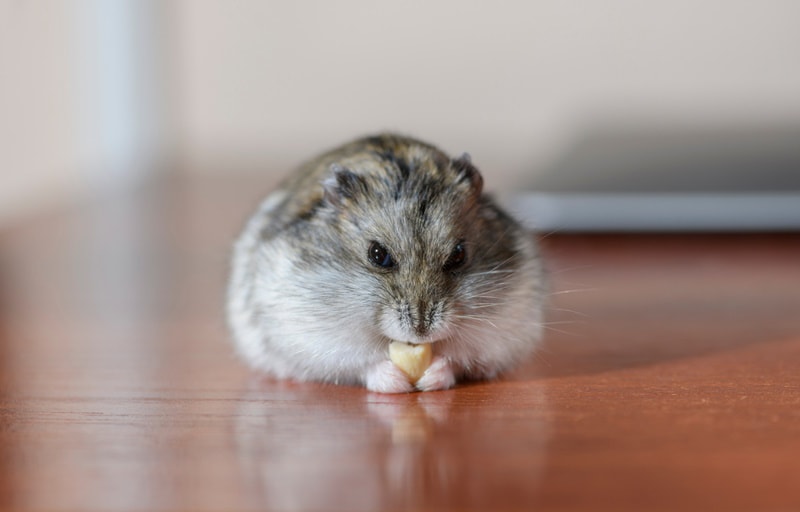
Can Hamsters Have Nuts in Shells?
Before we answer this question, did you know that hamster front teeth continually grow throughout their lifetime? That said, allowing your hamster to gnaw on safe objects and foods helps keep the incisors at a healthy length. Overgrown incisors can cause damage to the mouth, causing bleeding and pain, which makes it difficult for your hamster to eat and can cause infections.
Certain nutshells can help keep the teeth gnawed to a healthy length; plus, hamsters love the challenge of opening the nut. However, it is generally recommended that almond nutshells should be removed first.
Tip: Soak the almonds in hot water for 15 minutes, then remove the skins and allow them to cool before giving them to your hamster.
Take Caution With Dwarf Hamsters
Dwarf hamsters are obviously smaller than their cousins, such as Syrian hamsters, which are larger. For example, walnuts are far too big for a dwarf hamster to handle, so it’s best to open the walnut and cut the nut into smaller pieces before giving any to your dwarf hamster.
You should also cut any nut you provide in half before giving it to your smaller dwarf hamster. As we’ve mentioned, nuts are high in fat and calories, and your dwarf will benefit from less.
Tips for a Healthy Hamster Diet
Pet hamsters benefit greatly from hamster pellet food made specifically for hamsters. These foods contain the proper, balanced nutrition for hamsters, as they require 15–25 % protein, 35–40% carbohydrates, 4–5% fat, and 5% crude fiber, and hamster pellets should form the basis of their daily diet. However, they also benefit from other hamster-safe foods given in moderation, such as:
- Carrots
- Greens
- Seeds
- Peas
- Apples
- Cucumbers
- Bell peppers
Hamsters are instinctive food hoarders and love to stuff their cheeks with food to consume later in peace away from predators. Or, they will hide food in certain areas of their cage. It’s vital to remove uneaten foods from your hamster’s cage, as spoiled food can make your hamster sick. Also, remember to provide fresh drinking water 24/7.
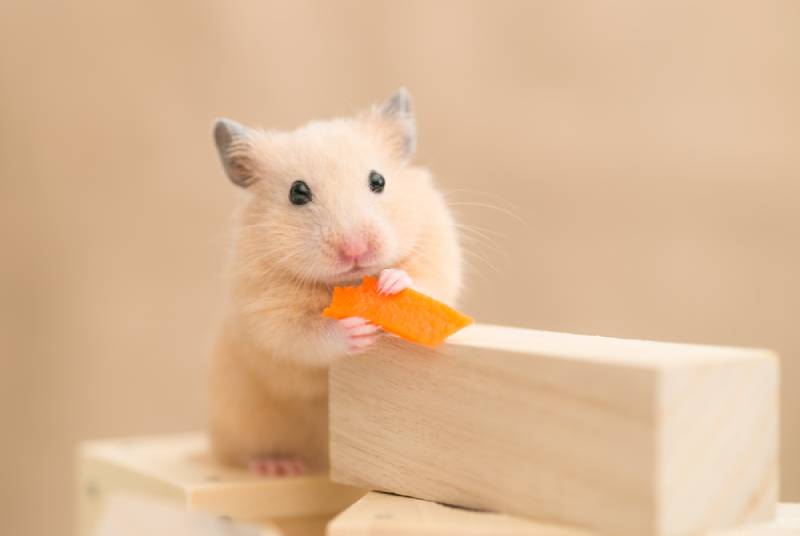
Final Thoughts
Most nuts are safe for hamsters, and larger hamsters can enjoy the thrill of opening the nuts to get to the tasty food content inside. Plus, it’s good for their continually growing teeth. However, ensure any nuts you provide are unsalted with no added seasonings. Remember to cut nuts in half ( or smaller) for dwarf hamsters and remove the almond shell and skin before providing them to any-sized hamster.
One last reminder: only feed nuts to hamsters in moderation, roughly one to two nuts per week.
See Also:
Featured Image Credit: Dionisvera, Shutterstock



